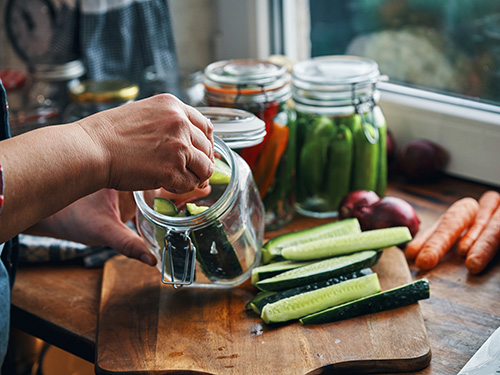It's Canning Time in Tennessee
Jul 14, 2025

Whether you use the vegetables or fruit grown out of your garden or buy fresh produce from the local farmers market, it’s the season to store what you have now to tide you over during winter.
Canning in the summer helps your meals still taste fresh when it’s cold outside.
Here are some tips and tricks if this is your first season to can.
Canning methods
There are two ways to preserve your food: using a water bath or pressure canning. The acidity of the food determines which method to use.
Water-bath canning is best for jams, jellies, pickles, tomatoes and fruit because those foods are high in acid. Make sure your water-bath canner holds enough liquid to cover jars by 1 to 2 inches and maintains a full boil.
Likewise, pressure canning is best for low-acidic vegetables like green beans, corn, and carrots.
When to can
It’s best to start the canning process within 24 hours of harvesting a veggie or fruit.
To maintain the best taste, don’t can overripe, bruised, or damaged produce.
Wash your produce thoroughly and blanche some vegetables before canning to preserve color and kill bacteria.
Make sure to use the ingredients in the recipe you’ve chosen. Don’t substitute items, particularly lemon juice, sugar, or vinegar.
Cool and store
After filling your jars and sealing, let the jars sit undisturbed for 12 to 24 hours before storing.
Double-check your seals because the lids shouldn’t flex when pressed.
It’s a good idea to label your jars with the date and what’s inside. Keep them in a cool, dark, and dry place.
Visit your local Co-op
Check your local Co-op for a selection of jar options. Our Ball® mason jars are available in different sizes and packs, ranging from 1 pint to 32 ounces. Be sure stock up on labels, lids, and paraffin wax as well so you’ll be ready to can your items soon after picking.
For canning items and more, visit your local Co-op.
Canning in the summer helps your meals still taste fresh when it’s cold outside.
Here are some tips and tricks if this is your first season to can.
Canning methods
There are two ways to preserve your food: using a water bath or pressure canning. The acidity of the food determines which method to use.
Water-bath canning is best for jams, jellies, pickles, tomatoes and fruit because those foods are high in acid. Make sure your water-bath canner holds enough liquid to cover jars by 1 to 2 inches and maintains a full boil.
Likewise, pressure canning is best for low-acidic vegetables like green beans, corn, and carrots.
When to can
It’s best to start the canning process within 24 hours of harvesting a veggie or fruit.
To maintain the best taste, don’t can overripe, bruised, or damaged produce.
Wash your produce thoroughly and blanche some vegetables before canning to preserve color and kill bacteria.
Make sure to use the ingredients in the recipe you’ve chosen. Don’t substitute items, particularly lemon juice, sugar, or vinegar.
Cool and store
After filling your jars and sealing, let the jars sit undisturbed for 12 to 24 hours before storing.
Double-check your seals because the lids shouldn’t flex when pressed.
It’s a good idea to label your jars with the date and what’s inside. Keep them in a cool, dark, and dry place.
Visit your local Co-op
Check your local Co-op for a selection of jar options. Our Ball® mason jars are available in different sizes and packs, ranging from 1 pint to 32 ounces. Be sure stock up on labels, lids, and paraffin wax as well so you’ll be ready to can your items soon after picking.
For canning items and more, visit your local Co-op.